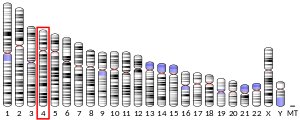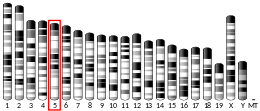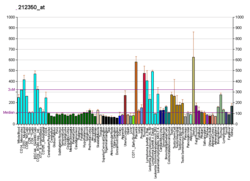TBC1D1
TBC1 domain family member 1 is a protein that in humans is encoded by the TBC1D1 gene.[5][6]
TBC1D1 is the founding member of a family of proteins sharing a 180- to 200-amino acid TBC domain presumed to have a role in regulating cell growth and cell differentiation. These proteins share significant homology with TRE2 (USP6; MIM 604334), yeast Bub2, and CDC16 (MIM 603461) (White et al., 2000).[supplied by OMIM][6]
References
- GRCh38: Ensembl release 89: ENSG00000065882 - Ensembl, May 2017
- GRCm38: Ensembl release 89: ENSMUSG00000029174 - Ensembl, May 2017
- "Human PubMed Reference:". National Center for Biotechnology Information, U.S. National Library of Medicine.
- "Mouse PubMed Reference:". National Center for Biotechnology Information, U.S. National Library of Medicine.
- White RA, Pasztor LM, Richardson PM, Zon LI (Sep 2000). "The gene encoding TBC1D1 with homology to the tre-2/USP6 oncogene, BUB2, and cdc16 maps to mouse chromosome 5 and human chromosome 4". Cytogenet Cell Genet. 89 (3–4): 272–5. doi:10.1159/000015632. PMID 10965142.
- "Entrez Gene: TBC1D1 TBC1 (tre-2/USP6, BUB2, cdc16) domain family, member 1".
Further reading
- Nakajima D, Okazaki N, Yamakawa H, et al. (2003). "Construction of expression-ready cDNA clones for KIAA genes: manual curation of 330 KIAA cDNA clones". DNA Res. 9 (3): 99–106. doi:10.1093/dnares/9.3.99. PMID 12168954.
- Roach WG, Chavez JA, Mîinea CP, Lienhard GE (2007). "Substrate specificity and effect on GLUT4 translocation of the Rab GTPase-activating protein Tbc1d1". Biochem. J. 403 (2): 353–8. doi:10.1042/BJ20061798. PMC 1874243. PMID 17274760.
- Stone S, Abkevich V, Russell DL, et al. (2006). "TBC1D1 is a candidate for a severe obesity gene and evidence for a gene/gene interaction in obesity predisposition". Hum. Mol. Genet. 15 (18): 2709–20. doi:10.1093/hmg/ddl204. PMID 16893906.
- Otsuki T, Ota T, Nishikawa T, et al. (2007). "Signal sequence and keyword trap in silico for selection of full-length human cDNAs encoding secretion or membrane proteins from oligo-capped cDNA libraries". DNA Res. 12 (2): 117–26. doi:10.1093/dnares/12.2.117. PMID 16303743.
- Rush J, Moritz A, Lee KA, et al. (2005). "Immunoaffinity profiling of tyrosine phosphorylation in cancer cells". Nat. Biotechnol. 23 (1): 94–101. doi:10.1038/nbt1046. PMID 15592455.
- Gerhard DS, Wagner L, Feingold EA, et al. (2004). "The status, quality, and expansion of the NIH full-length cDNA project: the Mammalian Gene Collection (MGC)". Genome Res. 14 (10B): 2121–7. doi:10.1101/gr.2596504. PMC 528928. PMID 15489334.
- Jin J, Smith FD, Stark C, et al. (2004). "Proteomic, functional, and domain-based analysis of in vivo 14-3-3 binding proteins involved in cytoskeletal regulation and cellular organization". Curr. Biol. 14 (16): 1436–50. doi:10.1016/j.cub.2004.07.051. PMID 15324660.
- Colland F, Jacq X, Trouplin V, et al. (2004). "Functional proteomics mapping of a human signaling pathway". Genome Res. 14 (7): 1324–32. doi:10.1101/gr.2334104. PMC 442148. PMID 15231748.
- Ota T, Suzuki Y, Nishikawa T, et al. (2004). "Complete sequencing and characterization of 21,243 full-length human cDNAs". Nat. Genet. 36 (1): 40–5. doi:10.1038/ng1285. PMID 14702039.
- Strausberg RL, Feingold EA, Grouse LH, et al. (2003). "Generation and initial analysis of more than 15,000 full-length human and mouse cDNA sequences". Proc. Natl. Acad. Sci. U.S.A. 99 (26): 16899–903. doi:10.1073/pnas.242603899. PMC 139241. PMID 12477932.
- Kikuno R, Nagase T, Ishikawa K, et al. (1999). "Prediction of the coding sequences of unidentified human genes. XIV. The complete sequences of 100 new cDNA clones from brain which code for large proteins in vitro". DNA Res. 6 (3): 197–205. doi:10.1093/dnares/6.3.197. PMID 10470851.
This article is issued from Wikipedia. The text is licensed under Creative Commons - Attribution - Sharealike. Additional terms may apply for the media files.




